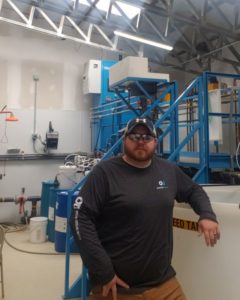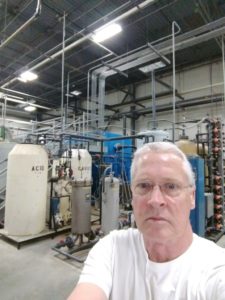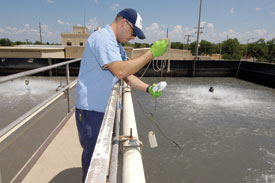There are some careers that are very profitable, satisfying, and important but receive very little publicity. This is true in the environmental field and particularly for the position of licensed wastewater treatment operator. For years companies have talked about the shortage of wastewater operators and how hard it is to staff their operations. Part of the problem is that there are more operators retiring than young people going into the field. (For more on this, click here). Yet, wastewater operators are always in demand and can have a steady career that pays well. In fact, experienced operators, often can work as independent contractors, working where and when they want, and can earn a very good income.
Wastewater operators have a very important job. These individuals have the responsibility of ensuring that a company is meeting or exceeding its permitted levels of contaminants that are released in the effluent water that leaves the plant. When wastewater is out of whack so to speak it can create real problems for a plant, and even shut down production causing thousands of dollars in losses and even fines. This makes the wastewater operator’s job crucial to the company.
Operators Unlimited staffs Wastewater Operators of various license levels in both Biological and Physical Chemical wastewater treatment. Because of this we can provide flexible operational support in North Carolina, South Carolina, and Georgia, to plants having various needs. Whether your plant needs a full-time operator, part-time relief operator, or you need us to run your entire wastewater operation, we have the knowledge, experience, and licensed personnel to help you not miss a beat. Our products and services provide the kind of predictability and operational efficiency to give you peace of mind. Our goal is to help you have a better day and we can do that, if we can manage your wastewater seamlessly and effectively so you can focus on your other key business aspects and not worry about wastewater.
So, what does a wastewater operator do? Well first, let us talk about the medium with which the wastewater operator works. What is wastewater? Wastewater refers to water that has been used in some process and as a result contains contaminants of some sort. Some contaminants in wastewater can include sewage, metal particles, chemicals, oils, food, and other suspended solids. In an industrial setting, contaminants must be removed before the water can be released back to the local municipal plant or into the environment. The Department of Health and Environmental Control enforces regulations that help to protect people and the environment.  Each manufacturing plant that discharges to a municipal treatment plant is granted a permit that details acceptable levels of these contaminants that can be released in the water. The wastewater operator performs functions that help the plant meet or exceed these acceptable levels. Wastewater operators are also often experts at maintaining a proper pH level of a plant’s wastewater. pH is another regulated aspect of wastewater.
Each manufacturing plant that discharges to a municipal treatment plant is granted a permit that details acceptable levels of these contaminants that can be released in the water. The wastewater operator performs functions that help the plant meet or exceed these acceptable levels. Wastewater operators are also often experts at maintaining a proper pH level of a plant’s wastewater. pH is another regulated aspect of wastewater.
To maintain proper balances in wastewater effluent, wastewater operators regularly perform many of the following tasks. Adding chemicals, such as polymers, acids, and other product, is a common function of a wastewater operator. Polymers are often used to help particles to separate out from the water. For more on the use of chemicals in wastewater treatment see this article. Other common tasks include monitoring meters and pumps, collecting samples, recording meter readings, operating equipment like pumps and presses, and performing maintenance on equipment. Of course, the actual daily tasks performed by a wastewater operator can vary from plant to plant.
The requirements to become a licensed wastewater operator vary from state to state, but most require some sort of training period as well as testing for each license level sought. In our home state of South Carolina, a one-year trainee period is required before a license can be obtained. Then you would proceed to obtain a license beginning with a D – level license and progressing up to an A- level license. There are separate licenses for Biological wastewater operator and Physical/Chemical wastewater operator. A little-known fact is that you can take the next level exam after only a 7 day waiting period. Of course, the more experience you have, the more practical knowledge you will have to pass the next level of exam, along with studying. Other states have similar requirements but vary slightly.
We at Operators Unlimited are always looking for licensed and experienced wastewater operators to join our team. If you live in North Carolina, South Carolina, or Georgia and are looking for full-time or part-time opportunities, email us a resume to [email protected].



